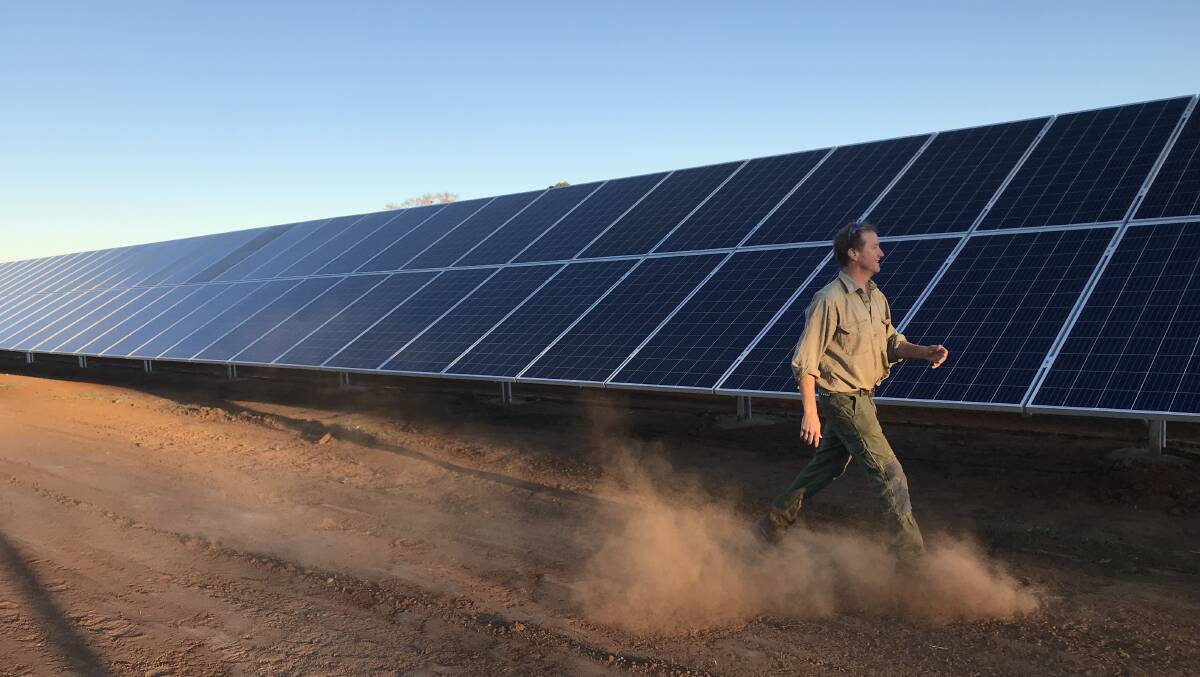
A Tamworth company is pushing the boundaries of solar capabilities, and helping to drought proof farms after unveiling Australia’s largest solar diesel hybrid irrigation pump at Narromine on Friday.
Subscribe now for unlimited access.
or signup to continue reading
The team from Tamworth based ReAqua developed the 500kW system, which has been installed on one of the largest irrigation enterprises in the region, with the 1500 solar panels covering one hectare of land.
The opening of the hybrid pump captured plenty of attention, not only from the industry, but also from parliament.
Minister for Primary Industries and Regional Water Niall Blair, joined Member for Parkes Mark Coulton, and Dubbo member Troy Grant, at the opening, as well as Chair of the Farmer’s Federation Fiona Simson and the CSIRO’s Grid and Renewables Integration leader Brian Spak.
Managing director of ReAqua Ben Lee said he was confident the technology would work because they have seen it work on smaller scales.
“We have been working on this system for 12 months – bridging the gap between expertise and knowledge around pumping systems with solar power,” he said.
“What was previously thought of as being impossible is now possible, and it is very exciting – there is nothing out there on this scale.”
Read more:
The system has been installed on Jon Elder’s property ‘Waverleigh’, which produces over 550 hectares of groundwater irrigated cotton, as well as 1000 hectares of wheat and other grains on un-irrigated land, which failed this year.
On average the property consumes 350,000 litres of diesel annually, which the solar installation has halved.
“We were looking for a farmer that was equally as passionate about the technology as us, and we needed a large application like this to prove that it could work – this pump is bigger than 90 per cent of any irrigation pumps out there,” Mr Lee said.
The new system is capable of “seamlessly blending diesel and solar power.”
“At this time of year at 6.30 am the pump uses 30 per cent solar and 70 per cent diesel, but by 7.30am is on 100 per cent solar until it winds back down in the afternoon,” Mr Lee said.
“If he only pumps in daylight hours he could go weeks or months without using diesel.”
By halving the operations diesel consumption Mr Elder believes the pump will pay itself off in five years, while the solar panels, the major cost, have a 25 year warranty.
“The high cost of diesel has been a real constraint on growth, and a factor in our vulnerability to drought. The partial switch to solar powered pumping is a game-changer for us,” Mr Elder said.
“Incorporating solar power will also reduce our carbon dioxide emissions by about 500 tonnes each year, and we’re very proud of that.”
The system is also an accredited power station under the Federal Government’s Large-scale Renewable Energy Target (LRET), administered by the Clean Energy Regulator.
Under the LRET scheme, the farm earns Large-scale Generation Certificates (LGCs) for power it generates. These are estimated at $120,000 over the next five years.
ReAqua are expecting to be flooded with orders in the coming months.
“I’ve got a big pipeline of operators that have said when they can feel it and see it work they will get one,” Mr Lee said.
This week ReAqua will begin their next solar diesel hybrid project on a property near Gunnedah, where a 95kW system will be installed.

